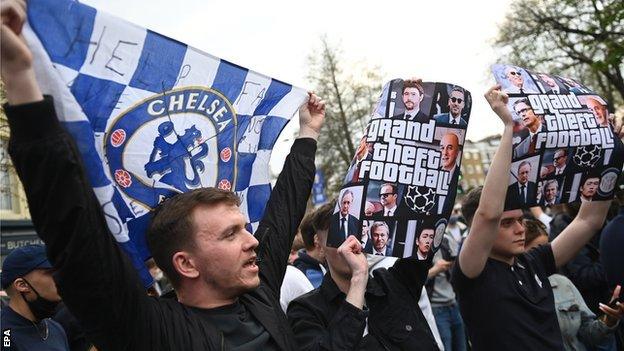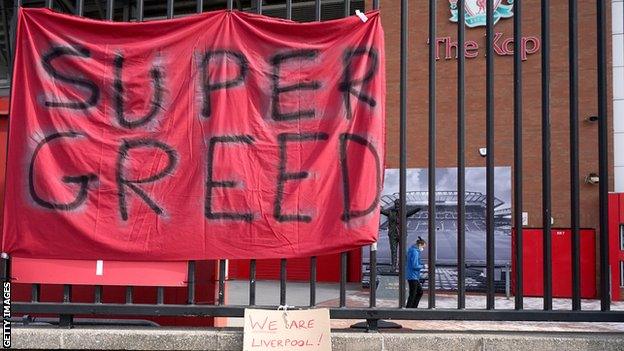European Super League: Legal report due - and why it matters
- Published

Chelsea fans protested against their club's involvement in the European Super League outside Stamford Bridge
Plans for a European Super League caused a seismic fallout across the football world when they were announced in April 2021.
The six Premier League sides that signed up to the project - Manchester United, Manchester City, Liverpool, Chelsea, Tottenham and Arsenal - quickly withdrew their support after a severe backlash from fans, football governing bodies and even government.
However, the plans have not been scrapped completely, with Real Madrid, Barcelona and Juventus still pushing the Super League idea.
On Thursday there will be a significant update in the saga.
A 50-page report will be published by the European Court of Justice (ECJ) on behalf of 69-year-old Greek Athanasios Rantos, the Advocate General of a case examining whether world football governing body Fifa and European counterpart Uefa abused their dominant position by banning participation in alternative competitions.
After the Super League plans were announced, nine of the clubs involved were fined by Uefa. But action against the remaining three - Real, Barca and Juve - was halted following this legal process.
The report will be Rantos' written opinion on the case and is non-binding, but it could influence the final decision. A 15-judge Grand Chamber will deliver the definitive verdict next spring.
Should Rantos lean significantly one way or another, it will be claimed as a victory. His words will be scrutinised on both sides of the debate.
It could be the start of club football changing forever.
Why is this happening now?
This is not, legally, an argument over the merits of a European Super League.
This case is ECJ answering a series of questions put to it by the Spanish courts when the ESL proposals were launched.
Those proposals brought an immediate threat of sanctions to the clubs involved and the players contracted to them from Uefa and Fifa.
The A22 Sports Management Group, which is behind the plans, argues that Uefa and Fifa's response was unfair. It believes clubs should be free to talk to whoever they like about the idea of setting up new external competitions without the threat of punishment.
Uefa feels it was entitled to take its stance in order to preserve the health of the wider game, which it said was being put at risk by the 12 clubs involved, whose motivation, it was argued, was one of self-interest and greed.

There were protests from football fans and players in England about the idea of the European Super League
The case for a Super League
One key proposal of the original Super League plan was no promotion or relegation.
A22 points to other examples of 'closed' competitions in world sport, such as rugby union's Six Nations, and says its updated Super League proposals now include access for other teams.
However, A22 presented no fresh plans at a meeting at Uefa last month, when it says it was "ambushed" by representatives of the European Clubs' Association, invited along to express their displeasure.
A22 says the core objectives of a Super League are to allow clubs to control their own destiny, have adequate corporate governance and enforce Financial Fair Play rules.
It is not clear whether English clubs would legally be allowed the join ESL given the commitment they gave not to get involved in further discussions in the aftermath of the first plan collapsing.
But this is not A22's argument. Its argument is solely against the monopoly position of the governing bodies as a pan-national competition organiser.
What is Uefa's stance?
Uefa says A22 is attempting to "blow up" the European sports model.
It feels any alterations to the format of the ESL would not alter the core point of a small number of clubs benefitting financially at the expense of the wider game.
Uefa also thinks public opinion is with them. Twenty-three countries gave evidence in support of their position to the ECJ. Some spoke to the ECJ for the first time. Uefa thinks A22's case has irregularities.
Overall, it is confident in its position.
What happens now?
The case is listed for 09:30 in Luxembourg (08:30 GMT) on Thursday.
It is anticipated that within an hour a three-page statement will be released with Rantos' major observations, with a full explanation expected shortly afterwards.
Neither side will be given advance warning of the findings before publication and, crucially, there will be no chance to address issues raised within it. The deadline for submissions has long since passed and will not be re-opened.
For those who wonder whether a European Super League remains a realistic possibility, Thursday's report is very important.

The gripping story of Sepp Blatter's rise and fall: Explore how football became synonymous with scandal
Match of the Day Top 10: The greatest World Cup Games ranked
